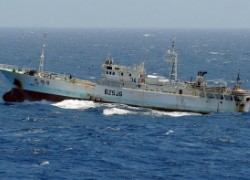
(al-Jazeera)
The economic conditions in Somalia are such that there is no shortage of men willing to hijack a ship, risking their lives in hopes of earning of the equivalent of 20 years of income – $5,000 in Somalia – out of a single $1.5 million ransom. That basic reality is the driving force of modern maritime piracy, and it leads to a similarly basic conclusion.
Aside from fixing the economic situation in Somalia, prosecution of those higher up in the criminal chain of conspiracy – the investors and financiers of piratical operations – is the most effective, non-violent means of to putting an end to maritime piracy. If labor is cheap and capital is scarce, it makes sense to go after the capital.
The United States government has done its part by prosecuting two pirate negotiators,[1. To be clear; negotiators are not financiers. Financiers perform much less physical labor and reap much more of the profits than negotiators. Though it is financiers that should be the ultimate targets, negotiators are in a similar legal position and are therefore highly relevant. Both groups facilitate, rather than perpetrate acts of piracy, and neither tends to enter the high seas.] Mohammad Saaili Shibin and Ali Mohamed Ali. The current dispositions of these cases highlight an interesting and important legal issue stemming from a common characteristic of piracy higher-ups. They themselves never set foot on the high seas.[2. This fact was stipulated in Shibin’s case but is still at issue in Ali’s. Although the government claims Ali spent only 24-28 minutes outside Somali territorial waters, it has admitted that there is no evidence that Ali actively facilitated piracy during that time period.]

(AP Image)
In Shibin’s case, Judge Robert Doumar allowed his trial to proceed; Shibin was found guilty and sentenced to 12 terms of life. In the Ali case however, which is still in progress, Judge Ellen Huevelle has found[3. Take a look at Judge Huvelle’s opinion, which is a fine example of the U.S. Federal Bench’s appreciation and understanding of international law.] that the perpetrator must be on the high seas for a crime of universal jurisdiction to occur.
What accounts for this discrepancy in United States courts? Who has the better of the argument? The answers to these questions have profound implications for the future of prosecuting those who profit most from piracy.
At the heart of this disagreement is a dispute over the proper interpretation of the UNCLOS definition of piracy and the United States’s federal statute criminalizing piracy under the law of nations. Both of these texts must be read according to one of the most basic canons of statutory interpretation — that statutory language not be read as being duplicative or ineffectual.
Opponents of a high seas requirement, such as Douglas Guilfoyle at University College London, argue that UNCLOS art. 101’s definition of piracy makes it clear that performing piratical acts carries a high seas requirement, but acts of inciting or intentionally facilitating piracy can be performed anywhere, implying that both are crimes of universal jurisdiction.
To support this argument, opponents cite art. 101(a)(i) of UNCLOS, which states that piracy “consists of…any act of violence or detention [or deprivation]… committed for private ends by the crew… of a private ship…and directed…on the high seas, against another ship” [emphasis added]. They contrast that section with the next part of the piracy definition, art. 101(c), which says “any act of inciting or of intentionally facilitating an act described in subparagraph (a)” constitutes piracy. Opponents of a high seas requirement for facilitators conclude that, because UNCLOS announces a high seas requirement in subparagraph (a) and not in subparagraph (c), no such requirement exists for facilitation.
Conversely, proponents of a high seas requirement, including Northwestern University’s Eugene Kontorovich, cite various provisions of UNCLOS suggesting that universal jurisdiction over maritime piracy exists only where the act takes place on the high seas.
Chief among these provisions are arts. 100 and 105. The former limits a state’s duty to cooperate in the repression of piracy, and the latter restricts states’ universal capturing and adjudicating authority over pirates to acts occurring on the high seas. Additionally, art. 86 explicitly states that Part VII of UNCLOS (the part including the definition of piracy) only applies to the high seas and other areas outside the jurisdiction of any state.
Opponents counter that even if all of the aforementioned high seas references are operable, the drafters’ inclusion of a high seas requirement in 101(a) is otiose if 101(a) and (c) already had an implicit high seas requirement. Any other reading, they argue, is contrary to one of the most fundamental canons of statutory interpretation.
This is a mistake stemming from a conflation of UNCLOS’s definition of piracy and its pronouncements on universal jurisdiction. Opponents may be correct in suggesting that there is no high seas requirement for facilitators to commit statutory piracy as defined by UNCLOS, but they are wrong in arguing that performing an act described in art. 101 leads directly to universal jurisdiction.
Where piracy is concerned, UNCLOS performs at least two discrete functions: defining piracy and delineating the metes and bounds of universal jurisdiction over piracy. Art. 101 defines piracy as, inter alia, any act of violence, detention or deprivation on the high seas or any act of inciting or intentionally facilitating such an act. Where the statutory definition is concerned, there is a high seas requirement for perpetrators but none for inciters or facilitators.
Art. 101 says nothing about universal jurisdiction, however, and the parts of UNCLOS that do discuss universal jurisdiction – arts. 100, 105, and 86 – make it unmistakably plain that such jurisdiction extends only to acts physically performed on the high seas.
This dichotomy between the statutory definition of piracy and the high seas requirement for universal jurisdiction over piracy is borne out in 18 U.S.C. § 1651, which reads, “Whoever, on the high seas, commits the crime of piracy as defined by the law of nations, and is afterwards brought into or found in the United States, shall be imprisoned for life.”
Section 1651 splices the definition of piracy and its high seas requirement as precondition for universal jurisdiction, outsourcing the former to international law (“as defined by the law of nations”) while making the latter explicit in the treaty (“[w]hoever, on the high seas”) , which is entirely consistent with the plain language of UNCLOS and the canon of construction at issue.
This means that, as defined by UNCLOS, negotiators and financiers who never set foot on the high seas have committed piracy, but that they have not committed a crime of universal jurisdiction. Unless higher-ups enter the high seas, they can be prosecuted only under the territorial, national, passive personality, and protective bases for jurisdiction.
At first blush, it may appear that such an interpretation does not bode well for those seeking to put an end to the global menace of maritime piracy, especially in light of the widely-held belief that the surest non-violent way to deter the piracy, apart from economic reconstruction in Somalia, is through the aggressive prosecution of so-called pirate “kingpins.”
In the coming weeks, however, I hope to dispel the notion that a high seas requirement for facilitators is bad for the international community. Such a requirement is in line with the policy rationale behind universal jurisdiction and it may ultimately be useful in prosecuting and punishing pirate financiers who never leave dry land.
Jon Bellish, the founding Editor in Chief of The View From Above, is a Project Officer at the Oceans Beyond Piracy project in Boulder, Colorado (though all of his views are his own), and he has experience in United States piracy trials. He just got on Twitter. This piece is cross-posted on Communis Hostis Omnium.


